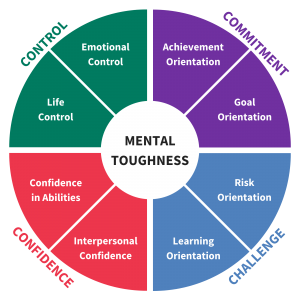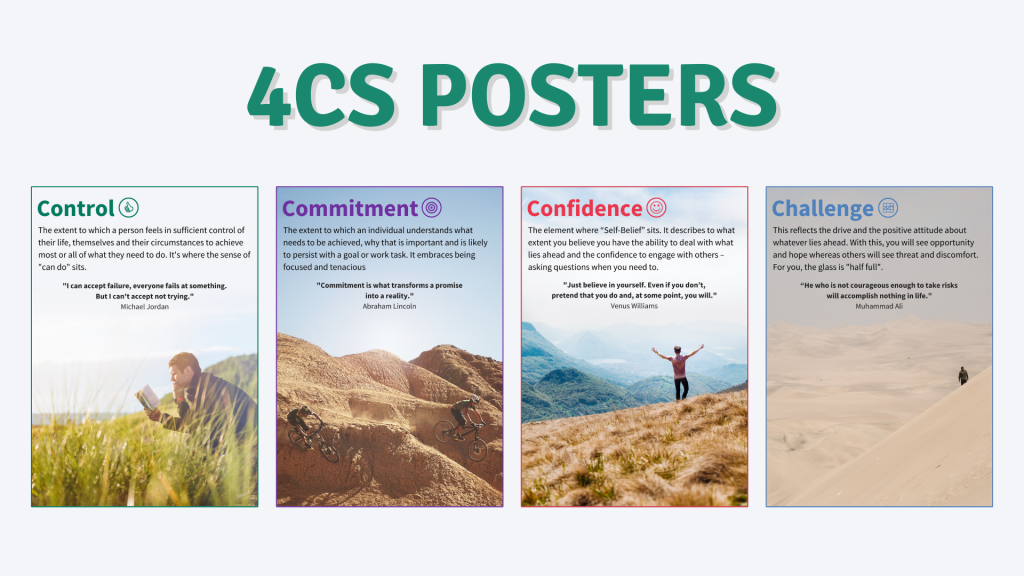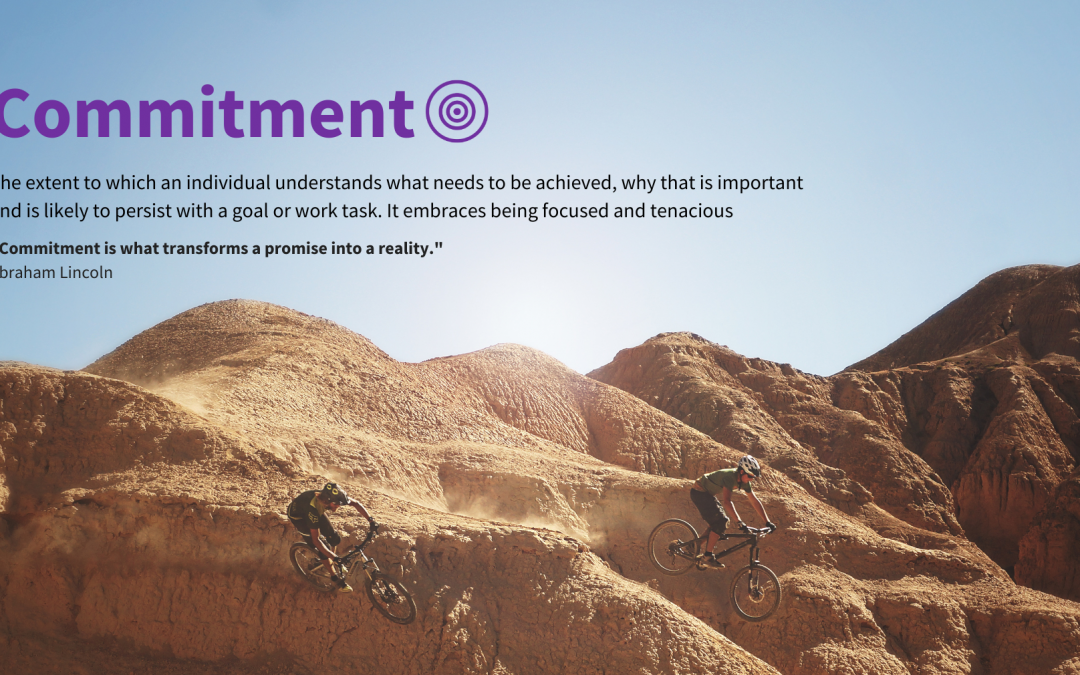WHY CAN COMMITMENT IMPACT ON MY PERFORMANCE AND WELLBEING?
WHAT DO I NEED TO UNDERSTAND TO DEVELOP THIS?
Commitment is the second of the 4Cs – which were identified by Clough and Earle as the major components of the mental toughness concept.
It is the factor that many will most easily relate to. 
Initially, this was thought to represent ‘stickability’ or an explanation for conscientiousness. However, feedback from practitioners suggested that individuals could be committed but wouldn’t consistently achieve their tasks—this needed explanation.
Subsequent research showed that the construct consisted of two independent but related factors:
Goal Orientation
This described the extent to which the individual has a sense of what they needed to achieve or should achieve and, importantly, why that was important. This suggests that a sense of purpose is relevant.
Essentially describing an ability to visualise what would be a good outcome, this generally enabled the individual to think in terms of goals and targets, both for the outcome and milestones.
Ultimately, the individual responds to a situation by thinking in terms of goals and targets.
The more mentally tough in this regard do this.
The more mentally sensitive, much less so. They can appear directionless and can be driven by others and by circumstances. For example, in a high-performance culture, they can be swept along by that culture without necessarily feeling that this is their mission. They can be effective but can be stressed by this.
Classical theory suggests that goal orientation would be a source of intrinsic motivation for people. Not always!
Achievement Orientation
Practitioner feedback and research found that, although some would talk about their goals with clarity and be committed to them, many would not do what it takes to achieve the desired outcome.
This factor then describes the extent to which the individual is prepared to do what is needed to deliver their goals and achieve their purpose.
This too suggests a form of visualisation is relevant.
The more mentally tough in this regard would be able to envisage what a successful outcome would be like and would even be able to have a sense of what it felt like to succeed. Wanting to experience this in reality, they would be content to make the effort – working long hours, experiencing discomfort and self-sacrificing foregoing more pleasurable activities.
The more mentally sensitive in this regard would find this disagreeable and would be much less inclined to make an effort. They are much more likely to give up.
Understanding these factors helps to explain why two people who are otherwise similar in most respects – experience, skills, knowledge, etc - can respond differently to the same situation even though both are well qualified to handle it and both can recognise its importance.
The difference between them lies in their mental attitude towards the task.
Studies show that these mental toughness factors explain conscientiousness as a behaviour. It also largely explains ideas such as grit or tenacity.
Commitment is also significant in understanding Resilience. Where Resilience is “the ability to recover from an adverse situation”, commitment represents “it’s gone wrong, but I am still minded to do what I can to achieve some or all of the original goal”.
As with all the mental toughness factors, this leads us to be understanding about people and not be judgemental. The factors do not describe “good” or “bad”. They are there to explain responses and enable the individual to be self-aware about why they act the way they do when something happens.
Although it is true that being more mentally tough on these factors often conveys an advantage, it is equally true that the more mentally tough can be disadvantaged at times. Especially if there is a lack of self-awareness about their pattern of mental toughness.
Apart from understanding in more depth these important psychological ideas, it has also drawn our attention to some important implications. These include:
Those who are more mentally tough when it comes to the Commitment construct, can, without self-awareness;
- Overcommit and set unrealistic goals
- Be perfectionists when realism is preferred
- Work too hard for long periods and fail to recognise the warning signs of burn out.
- Be intolerant of others who are not driven like them.
- Set goals for everything and find it difficult to prioritise.
- Fail to respond to changing priorities.
- They can be stubborn, fixated on their own agenda and not that of the team
- Be anxious until the task is completed
Those who are more mentally sensitive can bring useful qualities to the team if these are acknowledged. They can;
- Be a useful barometer to scope the difficulty of a task.
- Be very aware of shortcomings in skills and knowledge.
- Be understanding of the way others respond when under pressure.
- Where they are achievement orientated, they can be a great resource for getting things done. They can be useful work colleagues if you are seeking support and compliance for your agenda. Without goals of their own, they can be persuaded to buy into yours.
- Bring a crucial dimension to development. All the factors in mental toughness can be developed. However, research consistently shows that training and development (and coaching) if it is not customised can be very ineffective and even harmful.
Although training can be individualised, it is rarely customised. There is still a tendency for “one size fits all approaches”. Solutions are generally drawn from a tool kit because they have been shown to work. Many do but they don’t all work for all people.
Development is a challenge and an opportunity like any other activity. The individual’s mental response will be significant in their capability to develop. Understanding someone’s mental toughness profile addresses the challenge of customisation.
Self-awareness about your mental responses – those invisible responses – really matters.
This and many other aspects are discussed much more fully in “Developing Mental Toughness” by Strycharczyk, Clough and Perry. Kogan Page 3rd Edition.
Like the image used in this post on Commitent and the 4Cs? A set of downloadable posters are available here.



